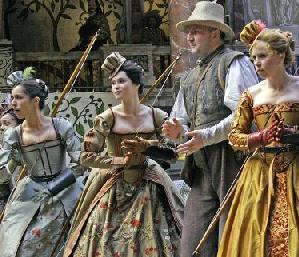SITE GUIDE
SEARCH
REVIEWS
FEATURES
NEWS
Etcetera and
Short Term Listings
LISTINGS
Broadway
Off-Broadway
NYC Restaurants
BOOKS and CDs
OTHER PLACES
Berkshires
London
California
New Jersey
DC
Philadelphia
Elsewhere
QUOTES
TKTS
PLAYWRIGHTS' ALBUMS
LETTERS TO EDITOR
FILM
LINKS
MISCELLANEOUS
Free Updates
Masthead
Writing for Us
A CurtainUp  London Review
London Review
 London Review
London ReviewLoveís Labourís Lost
|
The words of Mercury are harsh after the songs of Apollo— Armado
|

Paul Rider as Boyet, Oona Chaplin as Katherine, Gemma Arterton as Rosaline, Andrew Vincent as Dull and Michelle Terry as the Princess of France.
(Photo: John Haynes)
|
The play itself is a veritable Renaissance "rom-com" of courtly love. Foolish lords find out that their ostentatious asceticism is no match for the taunting but alluring ladies of the French court. There are solemn oaths broken almost as soon as they are made, love letters which are written, lost and exposed, as well as counterfeit Russian masquers and a ludicrous, cruelly mocked, pageant. Moreover, punning banter, sparring dialogues and arcane paranomasia make this play a linguistic romp or, as the page Moth (Seroca Davis) says, "a feast of languages". The strings of Latin repartee and esoteric word-play mean that the text is at times as cumbersome as the auditorium space.
The design is beautiful and fresh, turning the Globeís stage into a world of courtly, bucolic love. Swathes of material decorated with foliage and inscribed with papyrus scribblings adorn the backdrop and transform pillars into trees. It firmly places the court and its nexuses of loversí chases and mirth within a specialised, hermetic idyll.
The two courts, led by the King of Navarre (Kobna Holdbrook-Smith) and the Princess of France (Michelle Terry), are directed with cleverly synchronised movements, so that their pack mentality is emphasized. Creating momentary tableaux, the courtsí satellites are choreographed to strike parallel poses. For example, when they hunt deer, the lords leap together as if on horseback and the ladies simultaneously aim their arrows at their quarry. Berowne is captivatingly played by the up-and-coming star Trystan Gravelle. Showing off a superb range, Gravelle is very funny (in both physical and verbal humour) as well as convincing as a lyrical lover. Gemma Arterton, in her professional stage debut, plays Rosaline with confident poise and a corresponding amount of wit.
In addition to the main characters, there is an entire spectrum of onlookers, including Don Adriana de Armado (Timothy Walker), a braggart lover and parodic exaggeration of the lords; Moth (Seroca Davis), his sprightly page; Costard (Joe Caffrey) a rustic, libidinous clown; and the pedantic schoolmaster Holofernes (Christopher Godwin: "I smell bad Latin!"). Like us, these characters are onlookers and on the edges of the beautiful, noble, frivolous court.
With this production, Dromgoole has achieved a fun, energetic comedy which does not descend into pantomimic silliness. Marcadťís interruption and the lack of the loversí resolution means the play ends on an emotional plateau. Many productions struggle to make this work onstage, but here, instead of being an awkward petering-out, this production turns it into a thematic strength. It is clear that the preceding action works as a vision of mortality: an interlude of laughter and love before death. With metatheatrical reflexivity, we see the ephemerality of the lives blessed with nobility, romance and merriment in a brief escapist glimpse, like a comic play.
|
LOVEíS LABOURíS LOST
Written by William Shakespeare Directed by Dominic Dromgoole Starring: Trystan Gravelle, Kobna Holdbrook-Smith, Michelle Terry, Gemma Arterton With: William Mannering, David Oakes, Cush Jumbo, Oona Chaplin, Paul Rider, Timothy Walker, Seroca Davis, Christopher Godwin, John Bett, Andrew Vincent, Joe Caffrey, Rhiannon Oliver Designer: Jonathan Fensom Composer: Claire van Kampen Choreographer: Si‚n Williams Fight Director: Renny Krupinski Text work: Giles Block Movement work: Glynn MacDonald Voice Coach: Charmain Hoare Costume Supervisor: Sarah Bowern Puppet Director: Steve Tiplady Running time: Two hours 45 minutes with one interval Box Office: 020 7401 9919 Booking to 7th October 2007 Reviewed by Charlotte Loveridge based on 11th July 2007 performance at Shakespeareís Globe, 21 New Globe Walk, London, SE1 9DT (Tube: London Bridge) |
|
London Theatre Tickets Lion King Tickets Billy Elliot Tickets Mary Poppins Tickets Mamma Mia Tickets We Will Rock You Tickets Theatre Tickets |




